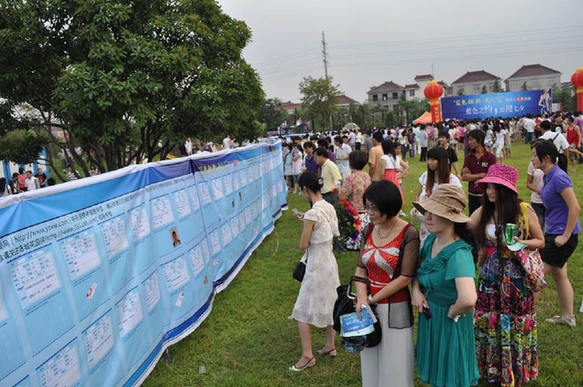If You Are the One: Love at First Sight
In the wake of China’s economic and social progress, numbers of shengnü (literally, “leftover woman”) are nevertheless growing. Shengnü is the name given to women in their late twenties, many of whom have been through postgraduate education and have well-paid jobs, who are still single. Dedicated to their careers, they don’t make the time to meet potential spouses. Nor are they willing to compromise in their quest for Mr. Right.
This TV show, therefore, reveals a social phenomenon daily observable in contemporary China. Young viewers can identify with these contestants, most of them in their 20s or 30s, in search of life companions. To Anne-Sophie, this is why Feicheng Wurao scores full marks: “Maybe lots of young Chinese women, like those on the program, haven’t found their significant other, so the show helps them to see that they are not alone. All 24 women competing are beautiful and talented. Theoretically, they should have no difficulties finding a husband, especially in China, where men outnumber women. But they are part of a more demanding generation, made up of educated and privileged urban women who expect to find the most suitable mate, even if it means delaying marriage.”
|
 |
|
A group dating event during August 2010 in Yangzhong City, Jiangsu Province. |
Controversy
Despite its flashy-color setting, sometimes high-voltage and other times mushy music, and its giggly ambience – all of which suggest that this TV show may be a bit dumbed down – Feicheng Wurao opens a window on actual Chinese society. A society with all its pros and cons.
In 2010, a comment by 22-year-old female candidate Ma Nuo prompted a nationwide reaction. To rebuff a suitor envisioning romantic bike rides, the venal young girl let out the now famous quip: “I’d rather cry in a BMW than smile on a bicycle.” It sparked a national controversy: is this individualistic, materialistic young generation willing to sacrifice traditional values on the altar of money? Things reached a pitch where the Chinese government stepped in. The State Administration for Radio, Film, and Television now has a say during the recruiting process and censors certain amoral remarks, which are daily more common as Chinese youth become more emancipated and laidback. The show is nonetheless still a far cry from the more brazen Western dating shows such as Next or Dismissed.
Anne-Sophie’s comment: “I sometimes don’t understand participants’ choices, especially when they don’t reveal their feelings, as we’d like (because we are, in one word, romantic!). Girls seem really pragmatic as they choose men with the best financial status, whereas boys seem superficial as they take on the most beautiful and pliable women.”
She suspects that what we see is not completely genuine. Chinese people seem too much at ease and sometimes depict themselves as caricatures, exaggerating one characteristic to the extent that it takes over their entire personality. However, former participants have confirmed in a wide range of interviews that, although they were given certain advice, everything the viewer sees is real. But candidates are carefully cherry-picked: only those who are young, good looking with a singular personality or atypical hobbies are selected. “Those girls are not stupid: they are there to put on a real show, not to teach the audience some values,” is Anne-Sophie’s belief. “Besides, any blatantly materialistic remark quickly arouses a buzz on the Internet, which proves that Chinese people react. Perhaps that is the real goal of this TV show: to make people talk and think.”

